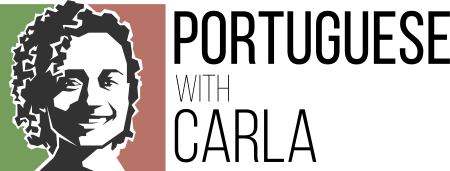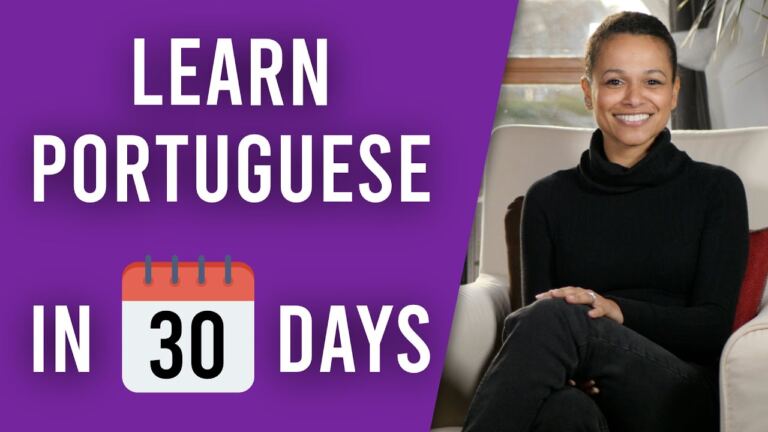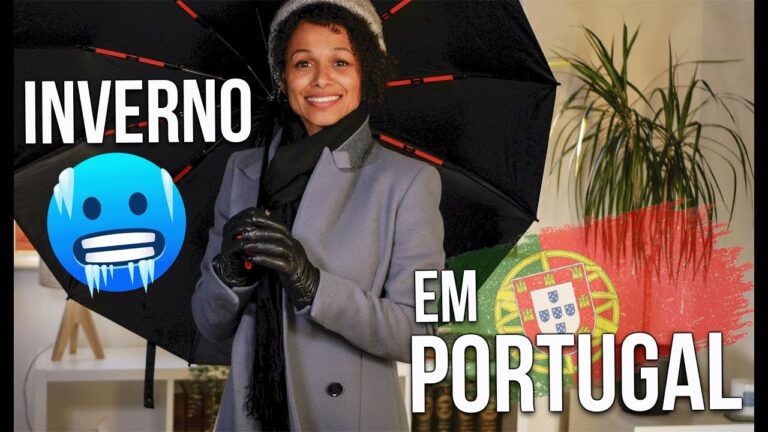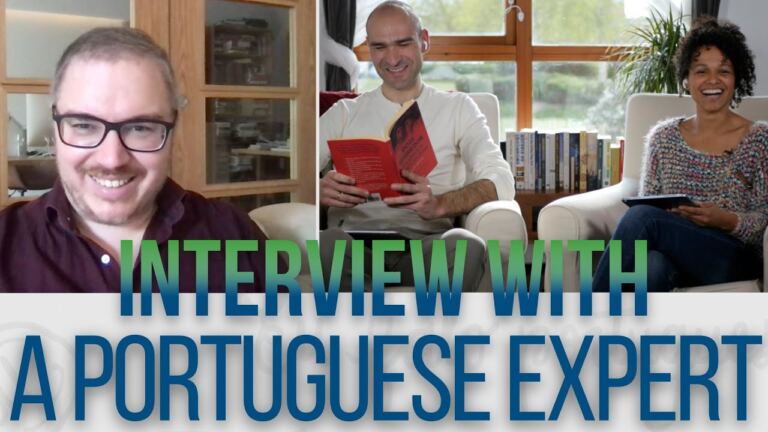Angolan Portuguese VS Portuguese from Portugal [EN & PT Subtitles]
In the video below, discover more about Português de Angola or Angolan Portuguese.
The Portuguese Language in The World
Portuguese is an official language in eight countries. They are Portugal, Brazil, Angola, Cabo Verde, Guinea-Bissau, Mozambique, São Tomé and Príncipe, and East Timor. At some point in history, each of these countries was a Portuguese colony.
How Portuguese Spread
The Portuguese territory expanded outside of Europe to the point that it became an empire during the Discoveries Era. It included several overseas provinces in Africa, Asia, and South America. In total, this empire lasted almost six centuries.
During this time, the Portuguese language was affected by outside influences. For example, the slave trade brought the influence of African languages to Brazil. In many cases, pidgins formed that later evolved into creoles and eventually became new languages. That was the case with Kaduverdianu.
The colonial period came to an end in the 20th century, and these countries were no longer under Portuguese rule. Still, Portuguese remains an official and widely used language in most of these regions.
The Portuguese Language in Angola
Before the April revolution in Lisbon, Portugal was under fascist rule. The União Nacional (National Union) was a political organization created to support the Portuguese government of the time. There was oppression, and the general society had restricted freedom.
Nevertheless, in 1974, members of the Portuguese army gathered to overthrow that rule and formed a revolutionary government. As a result, most colonies attained liberation and were able to form independent governments.
The struggle for Angolan independence meant the intervention of the Soviet Union and the United States on opposite sides of the conflict. Angola reached total independence in November 1975. After the crisis, the country was influenced by men like Álvaro Holden Roberto, who founded and led the National Liberation Front of Angola (FNLA) from 1962 to 1999.
Angola Today
Today, Angola is an independent country on the west-central coast of Southern Africa. It borders Congo and the Democratic Republic of the Congo, Zambia, and Namibia. The capital, Luanda, is in Northern Angola and is home to over ten million people. Its longest river is the Kwanza River, with about 960 km long.
Angola has one official language, Portuguese, but it has dozens of national languages. These languages are spoken all over the country’s territory. In rural areas, the population uses mostly African languages. Still, most Angolans who live or were born in urban areas, like Luanda, speak Portuguese. There are also many French and English speakers.
The Portugal – Angola Relationship
Today, Angolan and Portuguese authorities maintain good diplomatic relations. Several laws and decree-laws opened the doors for cooperation between the nations. Thus, many Angolans move to study or work in Portugal and become Portuguese citizens. Likewise, for many Portuguese, Angola offers a wide range of personal and professional opportunities.
Get Fluent: Learn More About European and Angolan Portuguese
So, I got the family together to talk about the differences between the Angola Portuguese and the European Portuguese. We will discuss the differences in vocabulary, pronunciation, and slang.
Discover how Portuguese has acquired new vocabulary by assimilating words of African descent. Watch the video below to dive into modern African studies and learn more about the culture of these two countries!
Bonus: “Secret” sounds used by the Angolas in conversation 11:29
Enjoy, Carla
Ready to become fluent in European Portuguese?
For the last decade, we’ve been working on putting together the best possible European Portuguese course. After much research, feedback from our students, and a number of iterations, we think we’ve got it! 😉
As a base, we used scientifically proven techniques to help with master pronunciation, phrase construction, oral understanding, grammar, and all the necessary bits to get you to fluency. At the same time, having learned foreign languages ourselves, we know the process needs to be engaging, varied, and enjoyable. The whole thing is presented as an adventure. It’s a course like no other, trust us!
Learn more about The Journey and start your free trial here.







Big fan is here, thanks a bunch for put effort into this and all videos which is so great and helpful for us.🖐😎
Muito obrigada. Muito interessante.
Carla, muito obrigada! 💖 Foi muito interessante! P.S. Danças angolanas são fogo 🔥🔥🔥
Podes crer 😁
@Portuguese With Carla creio 😁
Thanks for the video! We always see videos comparing European & Brazilian Portuguese, but never any of the varieties from Africa. I’m glad you made this video (as well as your other video on Angolan Portugese) so that folks will learn more.
Da nada! ☺️
This was amazing! I can’t wait to listen again and and understand more… I find the connections and similarities of certain sounds we make as African Americans fascinating.. like uhmm-uhmm, or like the little smacking sounds .. You guys rock! Please continue with the awesome cultural notes within your language traing! I’ve shared this with many friends… can’t wait for more!
Thanks Latonya! That’s great you are able to relate to some of the sounds Angolans make – it sure makes the experience of learning Portuguese a lot more interesting 😃
Also treating each other as “brother” or “sister”. “Mano” or “mana” in Portuguese. It might have to do with the old Congo Kingdom in Northern Angola, a common origin of many enslaved Africans in the US.
Thank you so much for this. Muito obrigada
Que beleza! A riqueza da língua no seu esplendor. É muito bonito ouvir diferentes variações da língua que falamos, sejam elas fonéticas ou gramaticais. 👍👍👍
Tem toda a razão, João – estas variações só enriquecem a língua portuguesa! Obrigada pelo seu comentário 😊
@Portuguese With Carla Não obstante, fosse um grande desafio para mim, diverti-me muito ao adivinhar o significado de algumas palavras. O contexto ajuda muito, mas havia palavras que era quase impossível de decifrar aquele significado escondido.
A palavra bué é calão. Carla, os teus vídeos são bué fixes.
Eu me esqueci de ti- Esta maneira de falar é interessante. É uma mistura entre o português do Brasil e o de Portugal.
De ti ou de si – é mais usado em Portugal. É como eu digo- Eles põem o pronome me/ te/ lhe, entre o verbo e o pronome pessoal.
O tu é mais formal? Ouvi bem?
10: 29- No meu entendimento, a palavra ” Só” aqui significa que não é preciso acrescentar mais informação. Diz-lhe só isto, não lhe contes toda a tua vida. Hoje, não vai dar- Chega, é suficiente, não digas mais nada.
10:41 Não é assim tão esquisito. Ainda estou chocado com o tratamento formal” tu”.
Carla e José, agora imaginem que o pronome pessoal” Vós” fosse formal, e o vocês, senhores, senhoras fosse informal.
Boda???? jejejejeje
Desconheço a palavra” Coixito”, mas a palavra seguinte” Fatigado”, ajuda muito a decifrar o significado dessa frase.
O contexto ajuda muito.
O kumbo é o ordenado.
Bumbar é trabalhar
Matabichar- matar a fome
Wy- Deve ser ” Tipo, gajo, individuo, meu”
Ruka- acho que é carro – Esta palavra é muito engraçada. Ruka significa” braço” em russo.
Biznu- Um negócio.
Machimbombo- Autocarro ou comboio??????????
Boiadu- bêbado.
‘Mambo’- Aqui o contexto não ajuda nada.
Jajao- é tudo mentira.
Pato- Talvez signifique que essa pessoa seja desagradável, estúpida,- Desmancha-prazeres. Esta é difícil.
Lots of similarities with Brazilian Portuguese!
Interesting, right 😀 but there are still differences between the 2, especially when it comes to vocabulary.
@Portuguese With Carla absolutely!
Brazilian Portuguese has Angolan roots
Obrigado. Fiquei namorado do Evandro…
De nada! 🙂
muito belo!👏
I am in Angola in Luanda, Marginal ❤️❤️❤️
Gostei bué🖤 fiquei surpreendido pela palavra “kaxiku”, porque no meu país (a Venezuela), se diz “cachifo” e tem o mesmo significado! 😮
Interessante 😀
Esse vídeo ‘tá bué nice 😂🤣
Mas a sério são poucos os que ainda falam machimbombo, agora nós falamos “WAWA”
I saw you on Olly’s video and I’m friends with Luciana (who did the Brazilian side). I’ve been studying Portuguese for over 20 years and still don’t get tired of learning new things. I was obsessed with BR-PT for most of those years, and lived in Brazil to get better, but then I went to live in Portugal and slowly started to accept EU-PT, as well as discover variants (such as AO-PT like you teach here). I was very pleasantly surprised to find out that Portugal – especially Lisbon – has such an African vibe to it, after coming from living in Brazil where almost everyone around me was Afro-Brazilian.
On a side note, a few months ago Portuguese with Leo had an Angolan on one of his videos and I found that to be super interesting too (especially the comment on bué vs. bué de). I also love the video Dicionário de Angolano from several years ago, on YT.
It’s really hard to find content for people like myself, who are already fluent, so I love finding the rare video online that shows another side to this beautiful language. Tá de parabéns!
This is great! I’m sharing all this with my Portuguese husband. He is learning a lot….🤣🤣
I would love to see a video of Mozambican people speaking Portuguese 🇲🇿♥️
Pensa-se que o machimbombo deriva da lingua inglesa machines bumb, trata-se dos primeiros autocarros públicos (fim dos anos 1800) usados naquela altura em portugal e por conseguinte esta palavra foi levada para as colónias, e sobretudo em angola onde fez-se desta palavra numa palavra composta: machimbombo.
Penso eu…
A verificar
Carla speaks beautiful and clear Portuguese, Bunita… 🙂
Nós os angolanos, não engolimos as vogais, gostamos de pronunciar as letras todinhas 😁
Muitos bom
Due to the European Portuguese put “ch”..kind of that sounds at the end of each words ..very similar to russian..and the other hand Brazilian Portuguese more like Italian sound..
it depends where in brazil, brazil has many accents.
Yola Semedo – Você me Abana
(English Lyrics)From Angola
🇦🇴🇦🇴🇦🇴🇦🇴🇦🇴🇦🇴🇦🇴🇦🇴🇦🇴🇦🇴🇦🇴
https://youtu.be/52qNm_sEasA
Começam entrevistar pessoas que nasceram e cresceram em Angola, esses mulatos n entendem mada do português da banda. Muita coisa errada ai
Sensacional!!! O português de Angola e do Brasil são muito parecidos. Provavelmente devido à influência africana que houve no Brasil.
i liked this video! Especially as a child of angolan parents it’s everytime a pleasure to get to know more angolan vocabs. Muito obrigrado pela essa video (Desculpa.. os meus conicimientos de escrever em português nao é o melhor 😅)
Eu entendo o teu português perfeitamente 😊 Mas podemos todos melhorar por ler mais em português 👌🏽
Absolutely one of my favourite videos of yours so far! Love the speed Angolan Portuguese is spoken at, sooo much easier to understand!
Obrigada! 🤗 Generally yes it can be easier to understand for sure 😊, but not every Angolan speaks the same, some speak faster than others and can have very strong accents.
@Portuguese With Carla Hi just found your channel love ❤️ it …..
@love yourself 💖 123 obrigada 🥰 we haven’t been as consistent as we would have liked, but working on it! 👌🏽
Que legal, referente a gramática do português de Angola parece com o português brasileiro, mas o sotaque para mim que sou brasileiro, parece com o português de Portugal. Adorei o vídeo! ❤
É verdade, Joni 😄 A gramática parece ser mais próxima do português brasileiro, mas o sotaque do português de Portugal. Se bem que em certas situações, como por exemplo o “e” final soar como um “i” se aproxima mais da forma de falar dos brasileiros – do meu ponto de vista ☺️
Obrigada pelo seu comentário 💖
Angola não foi mais de 400 anos colonia de Portugal. porque desde a fundação da cidade de Luanda até a data da independencia é exatamente 400 anos. E levou alguns seculos até os portugueses se establecerem no interior do país. em outras palavras, os Portugueses se mantiveram mais é no litoral do país.
Só a partir de 1920 é que o interior de Angola (talvez 80% do país) começou a ser ocupado pelos Portugueses
Quilape/kilape, é quando compramos algo dizendo que pagaremos depois..
O Vando a falar a mwangolé 😂😂😂😂
Carlota, me convida na próxima vez pra participar Yá! ( modo mwangolé activado)😅
Podes contar com isso! 🤗
I really liked the discussion of “sound affects” when speaking. I was born and raised in Africa but have lived in Europe and the US as well. I have noticed that people of African descent use sound effects when communicating with other people of African descent. Whether they are African Americans, Caribbeans, Black British, Nigerians, South Africans, or Ethiopians they have their own distinct sounds that convey more than an entire library of books could convey about something. It’s a wonderful thing to see that Angolan do the same thing. It’s also funny to witness the facial expressions that go along with the sounds as well.
Just the other day I was watching tv with mum and an aunt, and a scene on a film made me go “hm hm” and mum went “hmm” and my aunt right after went “hm” 😂 We said it all in a matter of 2 or 3 seconds! It’s amazing how communication goes way beyond spoken words 😁
“Eu te vi ontem ” (” eme nga ku mona mâza”) kimbundu, influência das línguas nacionais, nas línguas nacionais o pronome reflexo vem antes do verbo
Loved this lesson and ADORED your guests!!
A maioria dos Angolanos falam bem o português. Muito melhor que os Brasileiros. Estes vídeos não informam nada só fazem confusão em relação há lingua Portuguesa…
No Brasil não se fala português, se fala brasileiro.
Que moral um cara de um país que as pessoas engolem as vogais ao falar tem para dizer que os brasileiros falam mal?! Os portugueses falam tão bem o português que a maioria dos gringos na hora de aprender esse idioma preferem a variante brasileira do que a de Portugal.
https://youtube.com/watch?v=Kj9Tp1VYKcM&feature=share
O presidente de Angola João Lourenço pronuncia a letra r normalmente mas eles pronunciam a letra r como Brasileiros.
A hindi proverb says : Fortunately, the Portuguese are as few in number as the tigers and lions or they would have wiped out the human race.
And that’s why we breed with others 🙂 hehehehhehe
I thought the portuguese angolan was exactly the portuguese from Portugal (because of the pronunciation), but i notice lots similarities with the brazilian portuguese.
😊 that’s really interesting, isn’t it? Even though Angola was colonised by the Portuguese, Angolan Portuguese has its particularities as it would’ve been influenced by the local dialects as well as the languages surrounding Angola. The Brazilian influence will likely come from the tv programs such as the many soap operas.
@Portuguese With Carla Or maybe it’s the other way around 😉
Angolans might influence Brazil centuries before soap operas 😉
@Lx, Portugal, I think it went and goes both ways 😊
Púrqui ?
Esqueceram de falar que o português de Angola sofre influência do brasileiro.
Mais fácil o português angolano que o de Portugal para nós brasileiros
Levando em consideração que quase 250 milhões de pessoas falam “te vi” no lugar de “vi-te”. É no mínimo crime proibir que se diga isso. Incrível
Portuguese is a beautiful language
Quero aprender portugues angolano
My dad worked offshore many many years ago
Like one stretch he was over there for like 2 years😊 back in the 70 I bet it’s changed a lot❤
He was a maritime engineer he had specialties😊